Borges Lectures, Conversation, and Interviews
- At July 30, 2018
- By Great Quail
- In Borges
 0
0
A writer—and, I believe, generally all persons—must think that whatever happens to him or her is a resource. All things have been given to us for a purpose, and an artist must feel this more intensely. All that happens to us, including our humiliations, our misfortunes, our embarrassments, all is given to us as raw material, as clay, so that we may shape our art.
—Jorge Luis Borges, Interview with Roberto Alifano, 1981-1983
Borges Works: Lectures, Conversations, and Interviews
This page profiles Borges’ lectures, conversations, and interviews that have been translated into English. The collections below are presented in chronological order, not by publishing date.
Professor Borges: A Course on English Literature
This Craft of Verse
Conversations with Jorge Luis Borges
Jorge Luis Borges: Conversations
Borges On Writing
Siete conversaciones con Jorge Luis Borges / Seven Conversations with Jorge Luis Borges
Siete noches / Seven Nights
Borges at Eighty: Conversations
With Borges on an Ordinary Evening in Buenos Aires: A Memoir
Twenty Four Conversations with Borges
En diálogo I, En diálogo II, Reencuentro diálogos inéditos / Jorge Luis Borges: Conversations, Vols. 1-3
Jorge Luis Borges: The Last Interview
Clicking the image of a book takes you directly to Amazon.com, unless it’s the original first edition, which just enlarges the image. Wherever possible, links to the Internet Archive are provided. These “online editions” may or may not match the exact edition of the corresponding book.
Professor Borges: A Course on English Literature
Lectures 1966
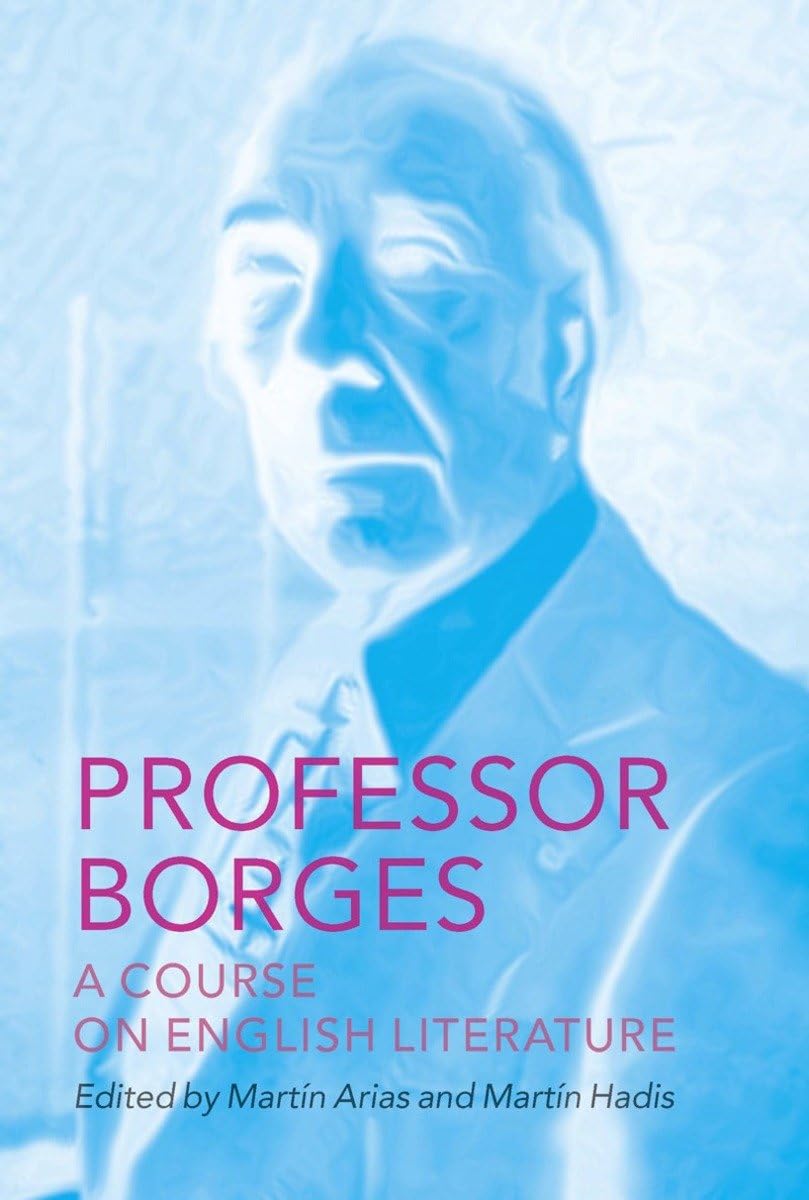
Professor Borges: A Course on English Literature
Edited by Martín Arias and Martín Hadis
Translation by Katherine Silver
New Directions, 2014
In 1966, Borges was appointed Professor of English Literature at the University of Buenos Aires. This book is an edited compilation of twenty-five of his lectures. The publisher offers this description by Edgardo Krebs:
Borges takes us on a startling, idiosyncratic, fresh, and highly opinionated tour of English literature, weaving together countless cultural traditions of the last three thousand years. Borges’s lectures—delivered extempore by a man of extraordinary erudition—bring the canon to remarkably vivid life. Now translated into English for the first time, these lectures are accompanied by extensive and informative notes by the Borges scholars Martín Arias and Martín Hadis.
Writing for Harper’s magazine, Edgardo Krebs describes Professor Borges: “Starting with the Vikings’ kennings and Beowulf and ending with Stevenson and Oscar Wilde, the book traverses a landscape of ‘precursors,’ cross-cultural borrowings, and genres of expression, all connected by Borges into a vast interpretive web. This is the most surprising and useful of Borges’s works to have appeared posthumously.”
This Craft of Verse
Lectures 1967-1968
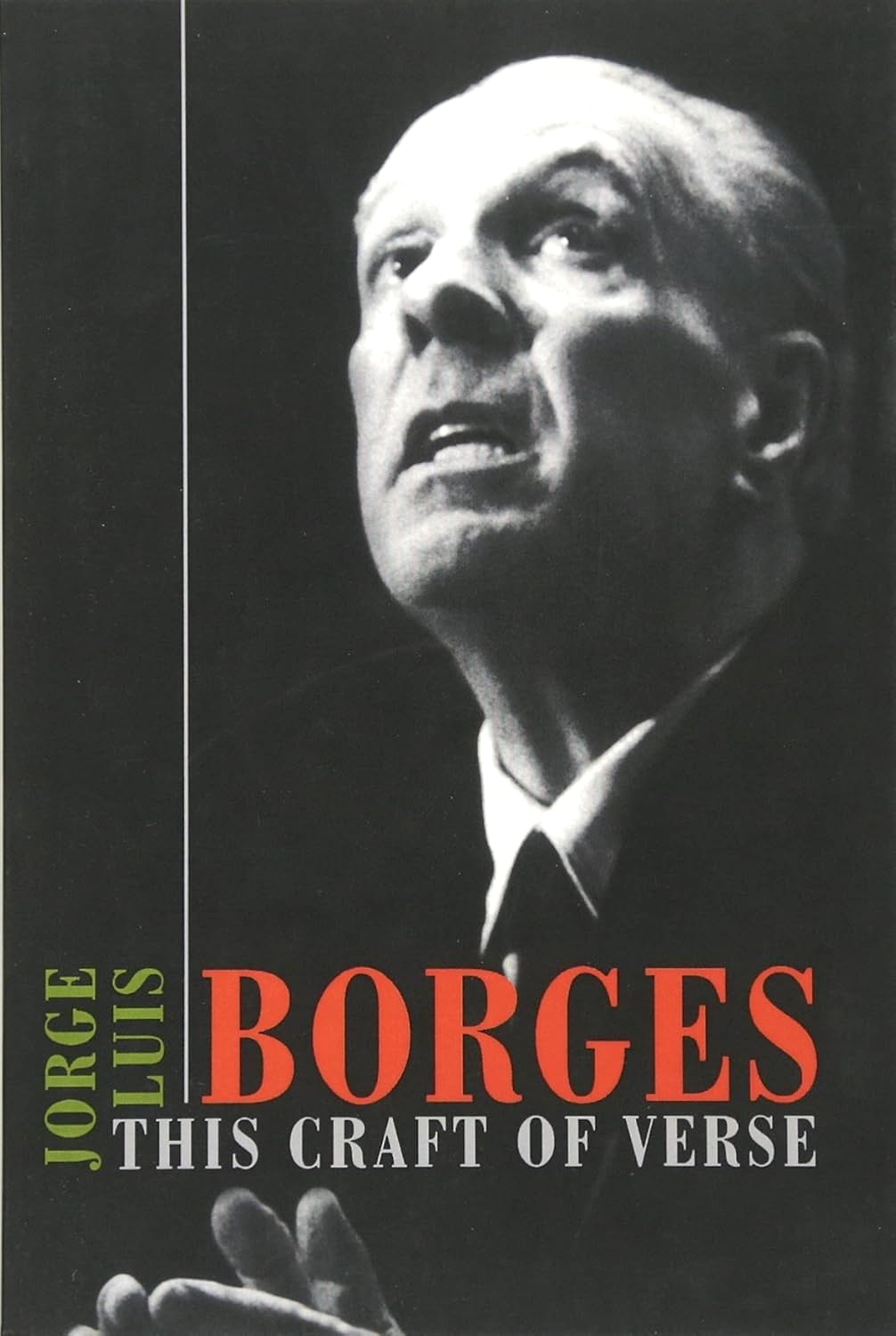
This Craft of Verse
Edited by Calin-Andrei Mihailescu
Boston: Harvard University Press, 2000
Online at: Michael Cabrera’s Blog
Listen at: YouTube
A published version of the Charles Eliot Norton lectures delivered at Harvard from 1967-1968, this volume collects six lectures that revolve around the subject of poetry. The lectures were recorded, but the original tapes were lost for thirty years! Only after they were accidentally discovered where they finally released to the public and transcribed, collected under the title This Craft of Verse. The Garden of Forking Paths has a full description and review of This Craft of Verse available on the “Borges Reviews” section.
Conversations with Jorge Luis Borges
Interview 1967
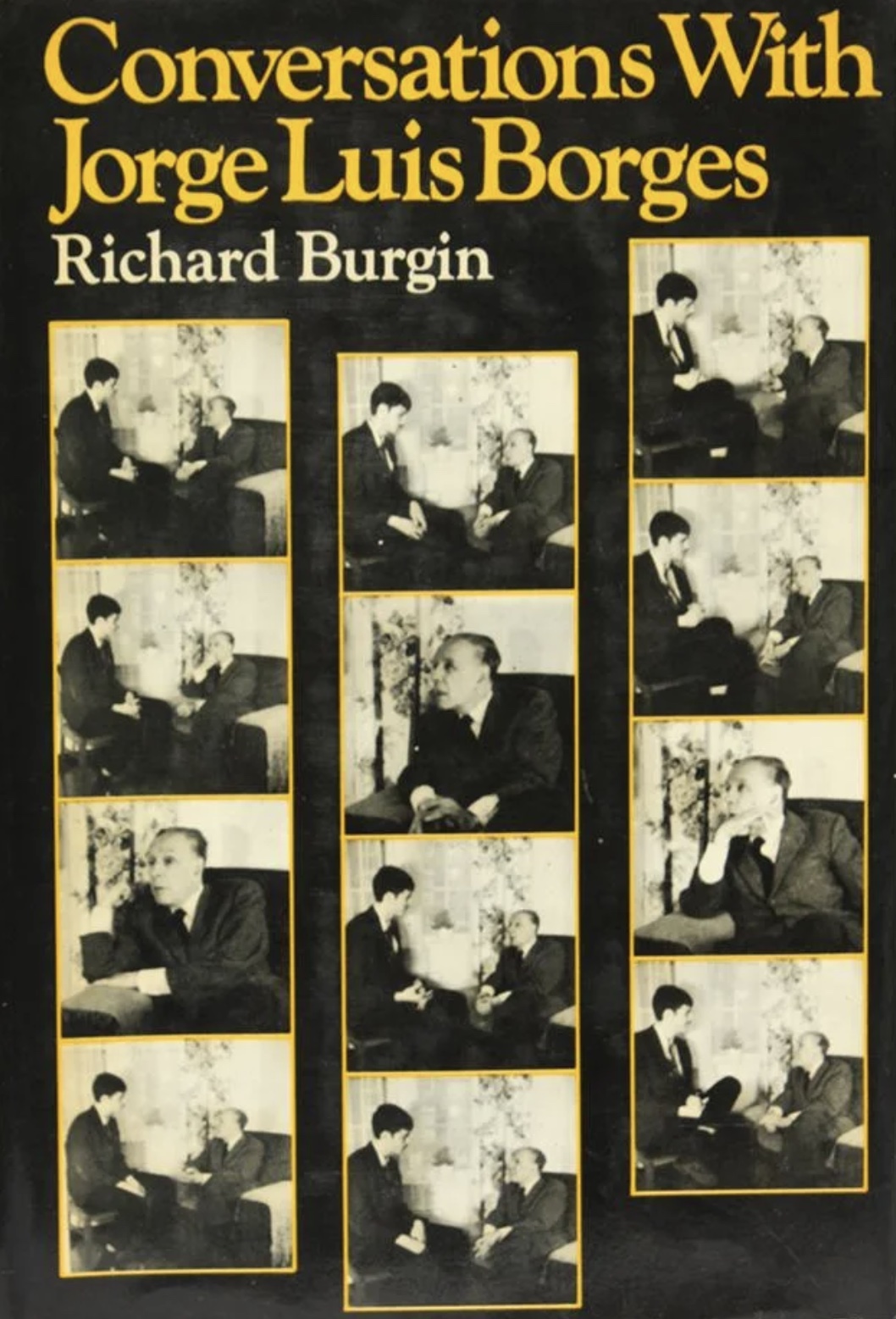
Conversations with Jorge Luis Borges
Interviews by Richard Burgin
Holt, Rinehart and Winston, 1969
Online at: Internet Archive
From 1967-1968, Borges delivered the Charles Eliot Norton lectures at Harvard. During this time, Richard Burgin requested to interview Borges for the purpose of writing a book. Although he would eventually become a successful novelist and academic, at the time Burgin was a twenty-year old undergraduate from Brandeis University. Borges agreed, and invited the young man to his apartment on Concord Avenue. Conducted over several sessions—with Burgin’s girlfriend fixing drinks from Borges’ own kitchen—the interviews were published the following year as Conversations with Jorge Luis Borges.
As its title suggests, the interview unfolds as an extended conversation, a companionable ramble across a broad range of topics. While Borges is always a fascinating conversationalist, a good interview requires a skilled interviewer, and the young undergrad performs flawlessly. Burgin keeps the conversation flowing with the skill of a professional, knowing precisely when to linger, when to probe for elaboration, and when to change subjects. He is enthusiastic and respectful, but never hesitates to push back against Borges’ occasional evasions. Despite his considerable erudition, Burgin remains modest and unpretentious. The reader can sense the two men warming up to each other as the sessions continue, and by the time they make their farewells, they part as friends. As Borges remarks in his introduction: “Two men who can speak together can enrich and broaden themselves indefinitely… Richard Burgin has helped me to know myself.”
Borges’ famous politeness is evident throughout the interview, and he still seems surprised to be receiving so much attention in the United States. He frequently asks Burgin for his own opinions about subjects, and often ends his statements with friendly “no?”, an almost conspiratorial invitation to agree—“I should say the West was invented by New Englanders, no?” Borges discusses his own writing enthusiastically, eager to promote recent work and offering pointed critiques of past “failures.” He offers numerous insights into his creative process, and explains how books like Personal Anthology and Dreamtigers came into being. Occasionally one glimpses a flash of pride, usually couched in a rhetorical question—“One of the best stories I ever wrote, eh?”
Other writers are discussed at length, with Robert Browning, Joseph Conrad, and Henry James singled out for praise, and Herman Melville, Franz Kafka and James Joyce treated more critically. He claims ignorance of Wallace Stevens, and dismisses H.P. Lovecraft as “bogus.” (Within a few years of this interview, Borges would be dedicating a pastiche to Lovecraft in The Book of Sand. Borges’ love/hate relationship with Lovecraft is even more ironic today, as modern criticism has remarked on the numerous parallels between the two writers.) Borges speaks freely about personal issues, treating his blindness with sublime indifference and commiserating with Burgin over their shared problem of insomnia. Borges also expresses some candid views on feminism, cockfights, and warfare that might surprise some contemporary readers!
Unfortunately, Conversations with Borges is out of print. A short excerpt was included in Conversations, a compilation of Borges interviews edited by Burgin in 1998 and confusingly given an similar title. A significantly longer excerpt is found in Jorge Luis Borges: The Last Interview, published by Melville House in 2013.
Jorge Luis Borges: Conversations
Conversations and Interviews 1966-1985
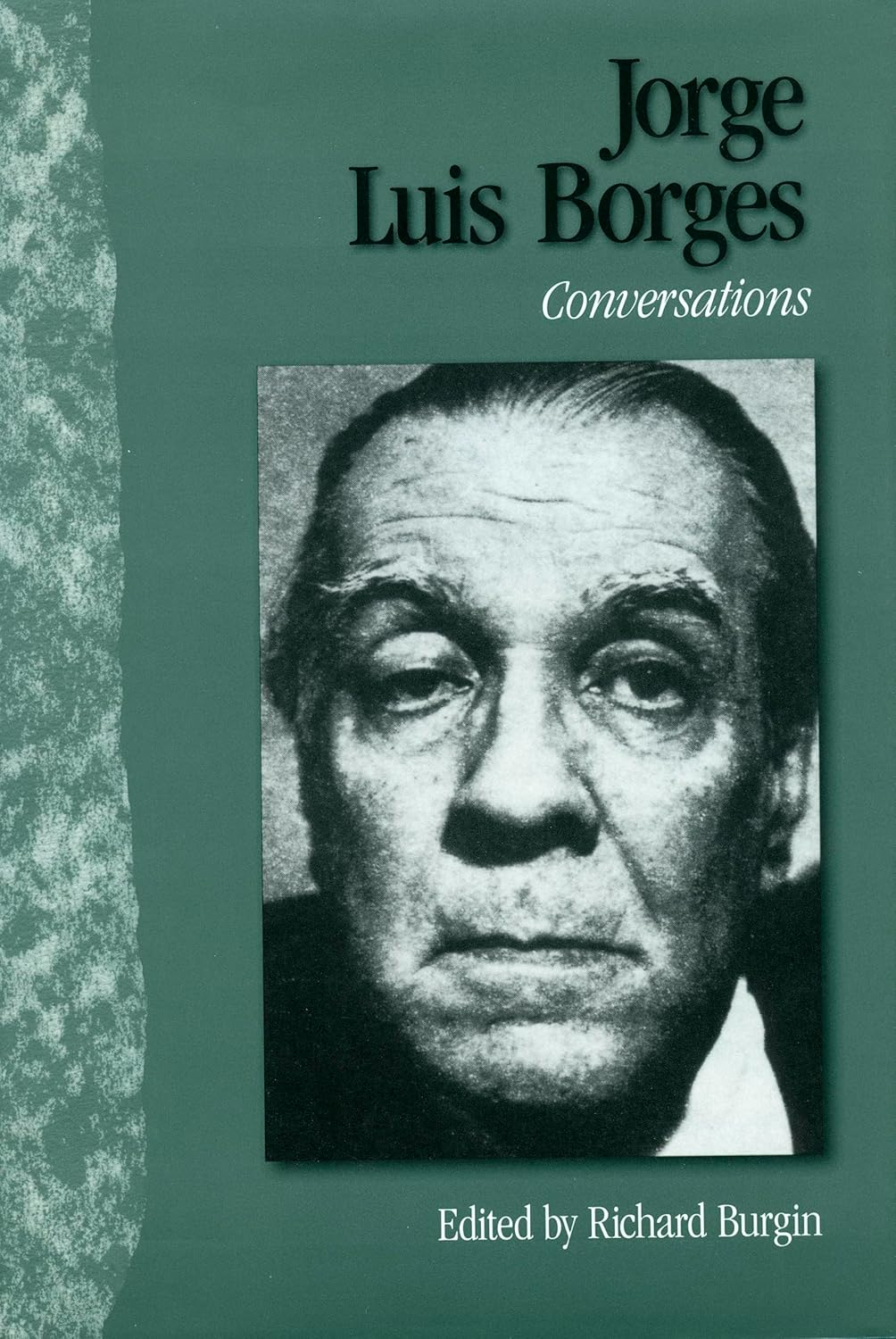
Jorge Luis Borges: Conversations
Edited by Richard Burgin
University Press of Mississippi, 1998
A compilation of interviews and conversations conducted between 1966-1985, edited by Richard Burgin, author of Conversations with Jorge Luis Borges. The contents are as follows:
- Introduction
- Chronology
- Borges on Borges (Richard Stern, 1966)
- The Living Labyrinth of Literature (Richard Burgin, 1967. Excerpt from Conversations with Jorge Luis Borges.)
- Jorge Luis Borges (Rita Gilbert, 1968)
- Jorge Luis Borges: An Interview (Patricia Marx and John Simon, 1968)
- Jorge Luis Borges (L.S. Dembo, 1969)
- Jorge Luis Borges (Selden Rodman, 1969)
- Borges at N.Y.U. (Ronald Christ, Alexander Coleman, Norman Thomas di Giovanni, 1971)
- With Borges in Buenos Aires (Willis Barnstone, 1975)
- A Colloquy with Jorge Luis Borges (Donald Yates, 1976)
- Now I Am More Or Less Who I Am (Miguel Enguídanos, et al, 1976)
- Thirteen Questions: A Dialogue with Jorge Luis Borges (Willis Barnstone, 1980)
- Borges: Philosopher? Poet? Revolutionary? (Donald Yates, 1982)
- An Interview with Jorge Luis Borges (John Biguenet and Tom Whalen, 1982)
- Jorge Luis Borges (Alastair Reid, 1983)
- Jorge Luis Borges: AN Interview (Clark M. Zlotchew, 1984)
- Borges on Life and Death (Amelia Barili, 1985)
- Index
Publisher’s Description: This anthology of interviews features more than a dozen conversations that cover all phases of his life and work. He discusses his blindness, his family and childhood, early travels, literary friends, and struggles to find his literary identity. In depth he examines the meanings and intentions of his own famous stories and poems, and he speaks of the writers whose works he has loved—Dante, Cervantes, Emerson, Dickinson, H. G. Wells, Kafka, Stevenson, Kipling, Whitman, Frost, and Faulkner—and of those whom he disliked, such as Hemingway and Lorca. Borges expresses his contempt for Perón and assesses the tumultuous politics of Argentina. He speaks also of the imagination as a type of dreaming, about issues of collaboration and translation, about philosophy, and about time.
Borges on Writing
Seminars 1971
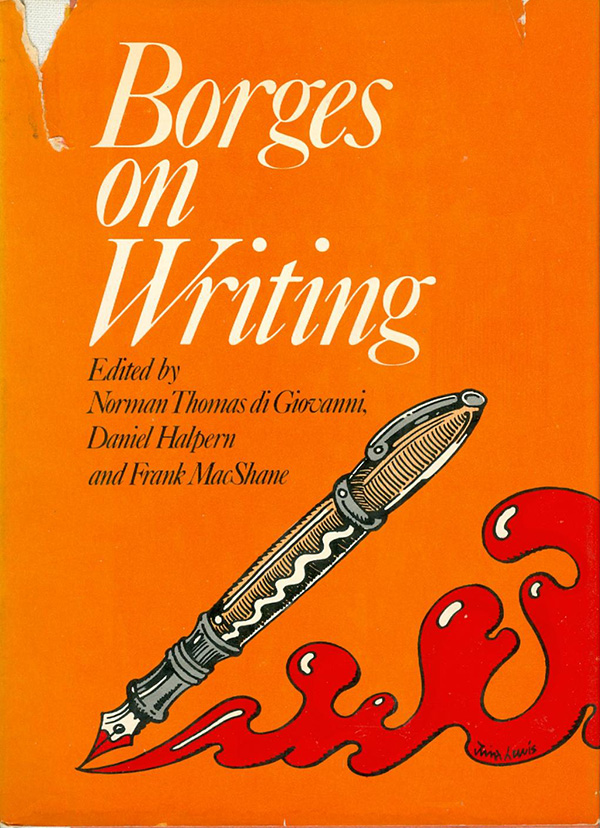 Borges on Writing Edited by Norman Thomas di Giovanni, Danile Halpern, and Frank MacShane New York: E.P. Dutton, 1972 |
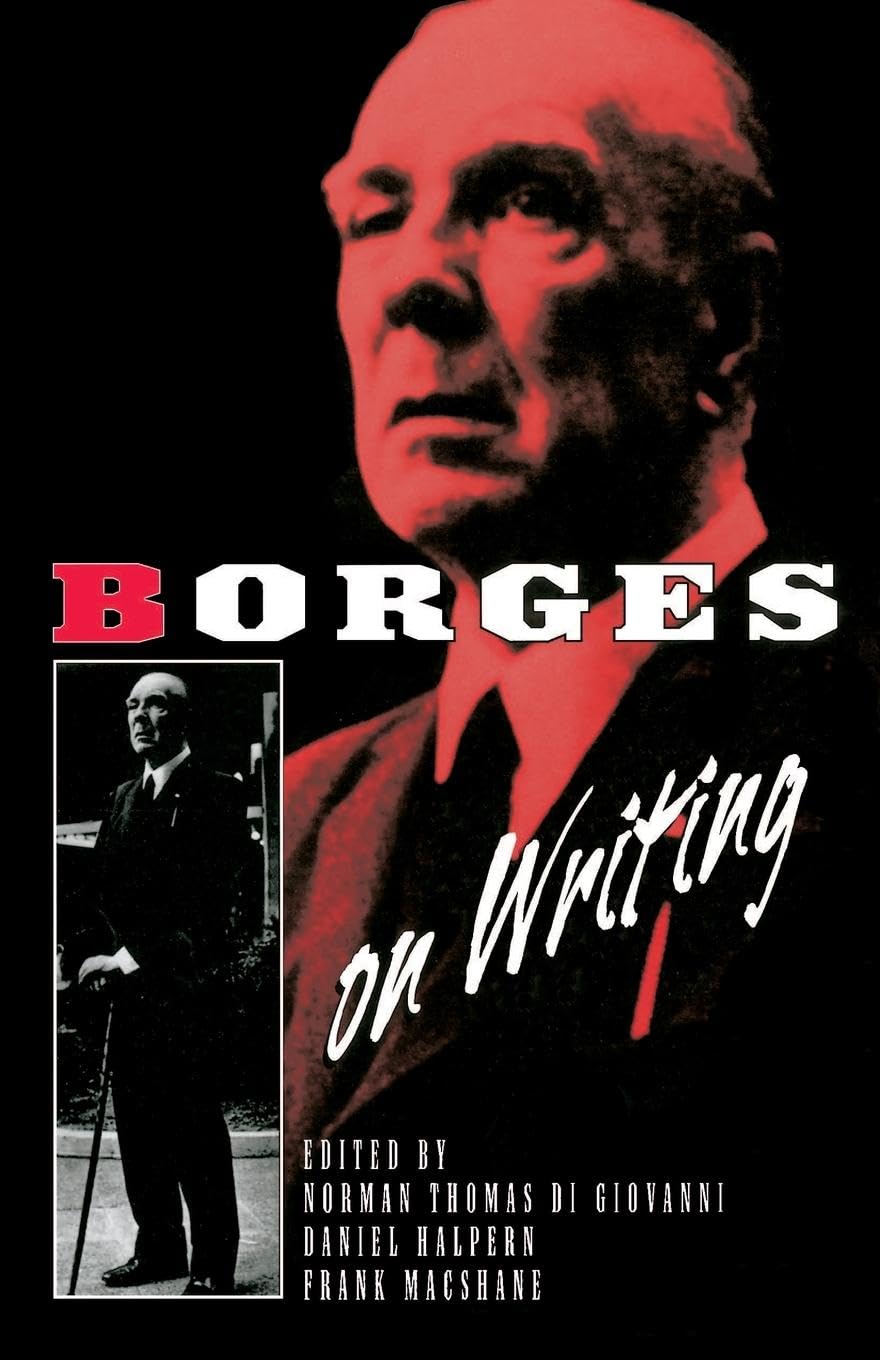 Borges on Writing Edited by Norman Thomas di Giovanni, Danile Halpern, and Frank MacShane Ecco Press, 1994 Online at: Internet Archive |
This short book contains the notes from a series of seminars on his writing that took place in 1971 at Columbia University. The book is divided into three sections: “Fiction,” “Poetry,” and “Translation.” Each section takes the form of a dialogue between Borges, Norman Thomas di Giovanni, Frank MacShane, and the students at the seminar. All three sections provide a unique look into Borges’ creative techniques and personal beliefs of writing.
Siete conversaciones con Jorge Luis Borges
Seven Conversations with Jorge Luis Borges
Interviews 1973
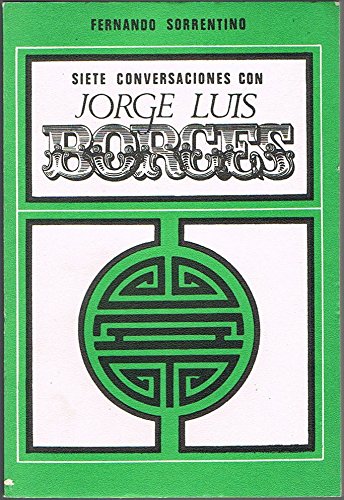
Siete conversaciones con Jorge Luis Borges
Interviews by Fernando Sorrentino
Buenos Aires: Casa Pardo, 1973
Online at: Internet Archive
Seven Conversations with Borges
Interviews by Fernando Sorrentino
Translation by Clark M. Zlotchew
New York: Paul Dry Books, 2010
A collection of seven interviews with Borges conducted by Argentine writer Fernando Sorrentino in Argentina’s National Library in 1972. Originally published in 1973 as Siete conversations con Jorge Luis Borges, they were translated into English by Clark Zlotchew for Paul Dry Books in 2010.
Publisher’s Description: Interviewer Fernando Sorrentino, an Argentinian writer and anthologist, displays literary acumen, sensitivity, urbanity, and an encyclopedic knowledge of Borges’ work. (In his prologue, Borges jokes that Sorrentino knows his work “much better than I do.”) Borges wanders from nostalgic reminiscence to literary criticism and from philosophical speculation to political pronouncements. His thoughts on literature run the gamut from the Bible and Homer to Hemingway and Cortázar. We learn that Dante is the writer who most impressed Borges, that Borges considered García Lorca to be a “second-rate poet,” and that he considered Bioy Casares one of the most important authors of the twentieth century. Along the way, Borges dwells lovingly on his native Buenos Aires.
Siete noches
Seven Nights
Lectures 1977
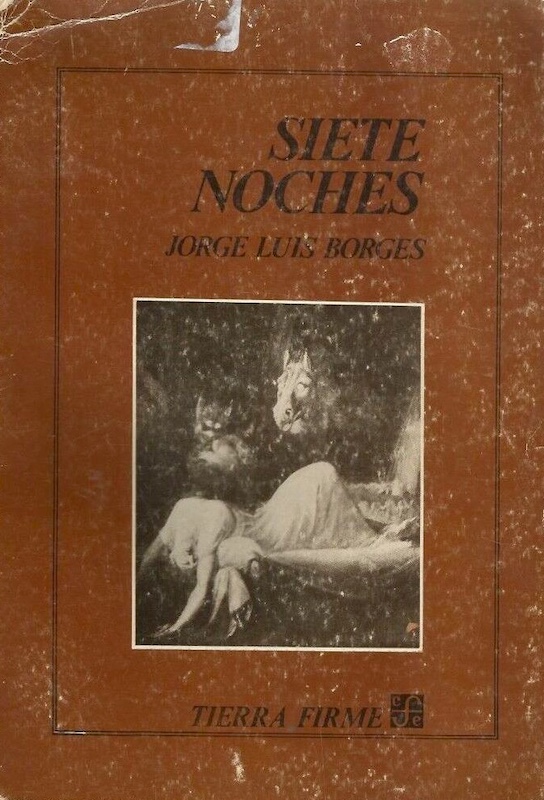
Siete noches
Mexico City: Fondo de Cultura Económica, 1980
Online at: Internet Archive
Listen at: Internet Archive
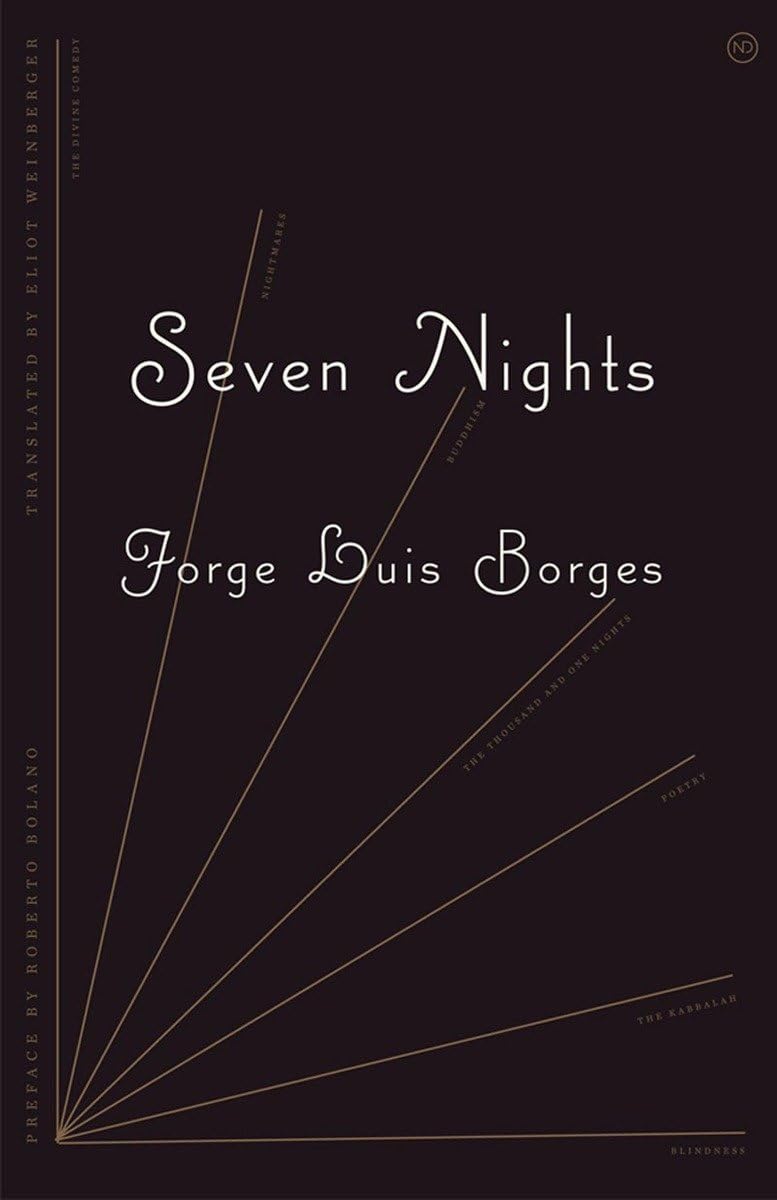
Seven Nights
Translation by Eliot Weinberger. Introduction by Alastair Reid. Preface by Roberto Bolaño
New York: New Directions, 1984
Online at: Internet Archive
Between June and August of 1977, Borges delivered seven lectures at the Teatro Coliseo in Buenos Aires. The lectures were taped and transcribed, appearing over the next few years as pirated records and “cut and mangled” newspaper articles. In 1980, Borges worked with producer Roy Bartholomew to edit and revise the lectures for Mexico’s Fondo de Cultura Económica, who published them as Siete noches.
Exploring a range of eclectic territory, the lectures are titled after their principal subjects. All of the lectures may be found online; clicking the link takes you to the YouTube clip. The English titles are the Eliot Weinberger translations.
1. La Divina Comedia (“The Divine Comedy”)
2. La pesadilla (“Nightmares”)
3. El Libro de las mil y una noches (“The One Thousand and One Nights”)
4. El budismo (“Buddhism”)
5. ¿Qué es la poesía? (“Poetry”)
6. La cábala (“The Kabbalah”)
7. La ceguera (“Blindness”)
Alternate versions may be found by a YouTube search for Siete noches.
Borges at Eighty: Conversations
Conversations and Interviews 1979–1980
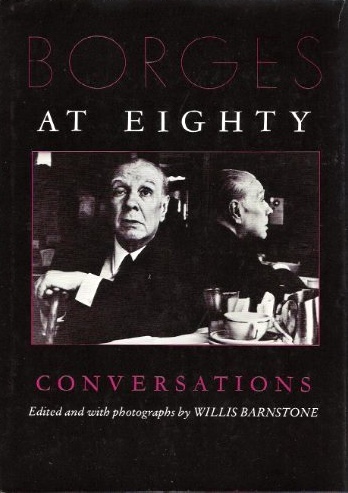 Borges at Eighty: Conversations Edited by Willis Barnstone Indiana University Press, 1982 Online at: Internet Archive |
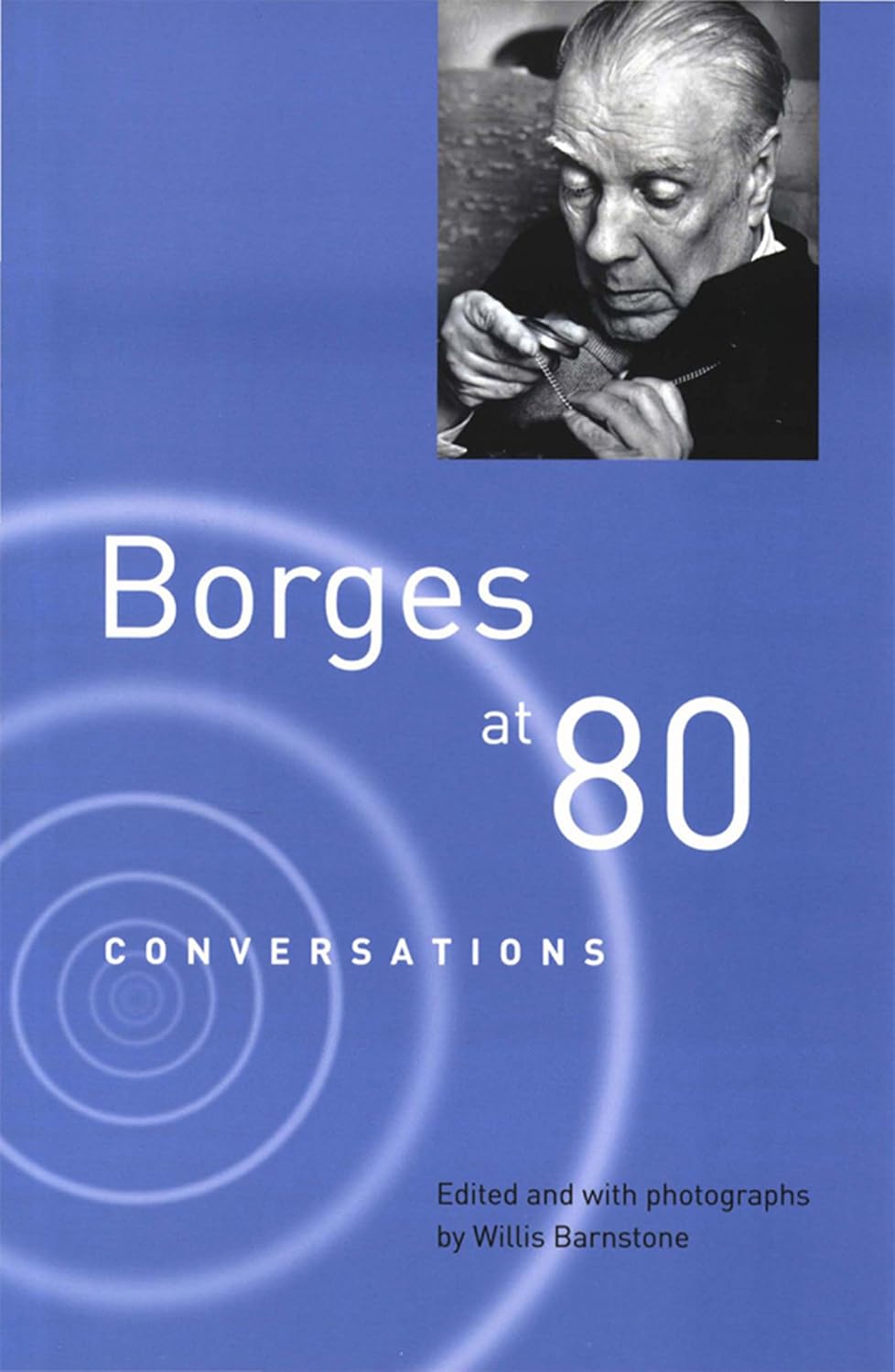 Borges at 80: Conversations Edited by Willis Barnstone New Directions, 2013 |
Originally published by the University of Indiana, this collection of interviews with Willis Barnstone, Dick Cavett, and Alastair Reid was edited by Borges’ friend and translator, Willis Barnstone. After falling out of print, a new edition was published by New Directions in 2013, which changed the title to Borges at 80.
Twenty Four Conversations with Borges
Interviews 1981-1983
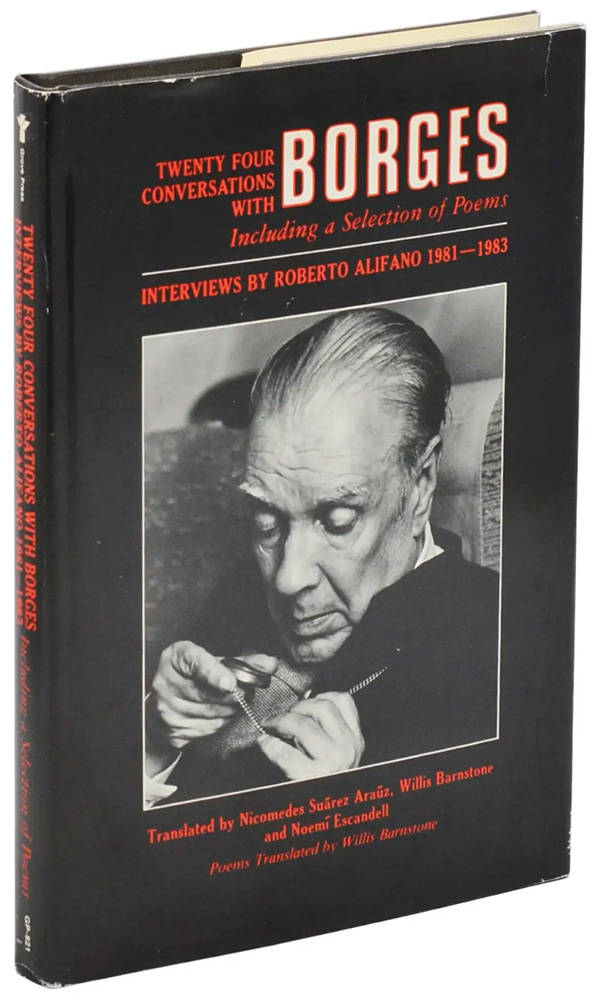
Twenty Four Conversations with Borges: Interviews by Roberto Alifano, 1981-1983
Interviews by Roberto Alifano; Translation by Nicomedes Suárez Araúz, Willis Barnstone, and Noemí Escandell.
New York: Grove Press, 1984
Online at: Internet Archive
From a contemporary review by Luis Harss, editor of Review: “The are delightful dialogues, very witty, agile; true conversations and not, as often happens with interviews, arcane sessions of rehearsed questions and answers. They have new facts, perspectives, and anecdotes, but above all they possess a refinement of the art of conversation, through which Borges has been creating perhaps his best literature in recent years.”
With Borges on an Ordinary Evening in Buenos Aires: A Memoir
Conversations
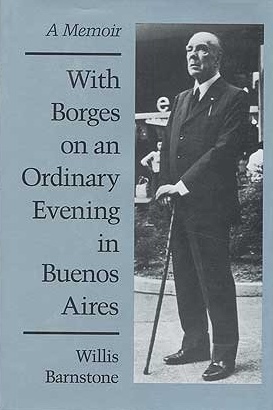
With Borges on an Ordinary Evening in Buenos Aires: A Memoir
By Willis Barnstone
University of Illinois Press, 1993
Borges’ longtime friend and translator Willis Barnstone created this memoir from his years working with Borges. Until the Garden gets its own thoughts online, here are a pair of opposing viewpoints.
From Publishers Weekly: “The author first met Argentine writer Jorge Luis Borges at a New York City poetry reading in 1968; their friendship deepened through the following years in encounters held in Buenos Aires and Cambridge, Mass. In this intimate, invaluable portrait, Barnstone, a professor of comparative literature at Indiana University, presents the poet-storyteller as a figure of paradox and contradictions. Nearly blind in his last decades, Borges longed for his life to end; he was obsessed with the instant after death that, he hoped, would reveal the mysteries of the universe. We see Borges, in place of the popular image of the cerebral metaphysician, as an itinerant sage, a tender lover who married his muse María Kodama on his deathbed, a troubled sleeper whose nightmares were filled with mazes. Barnstone’s fluent translations of Borges’s verses enliven these reminiscences and conversations.”
From Library Journal: “This whimsical account intersperses random recollections of desultory musings on such topics as death, suicide, and, especially, literature, with both pithy sayings and snatches of poetry from Argentine master Jorge Luis Borges. As outtakes from Barnstone’s journal, transcribed during the 1970s and 1980s, about his worldwide travels and encounters with Borges, the reminiscences smack of déjà vu, recalling in particular his more illuminating Borges at Eighty, from which he has cloned an entire interview. The final product is a work that is too much Barnstone and not enough Borges. Not an essential purchase.”
Borges en diálogo, Libro de diálogos, Diálogos últimos
(En diálogo I, En diálogo II, Reencuentro diálogos inéditos)
Jorge Luis Borges: Conversations, Vols. 1-3
Interviews 1984–1985
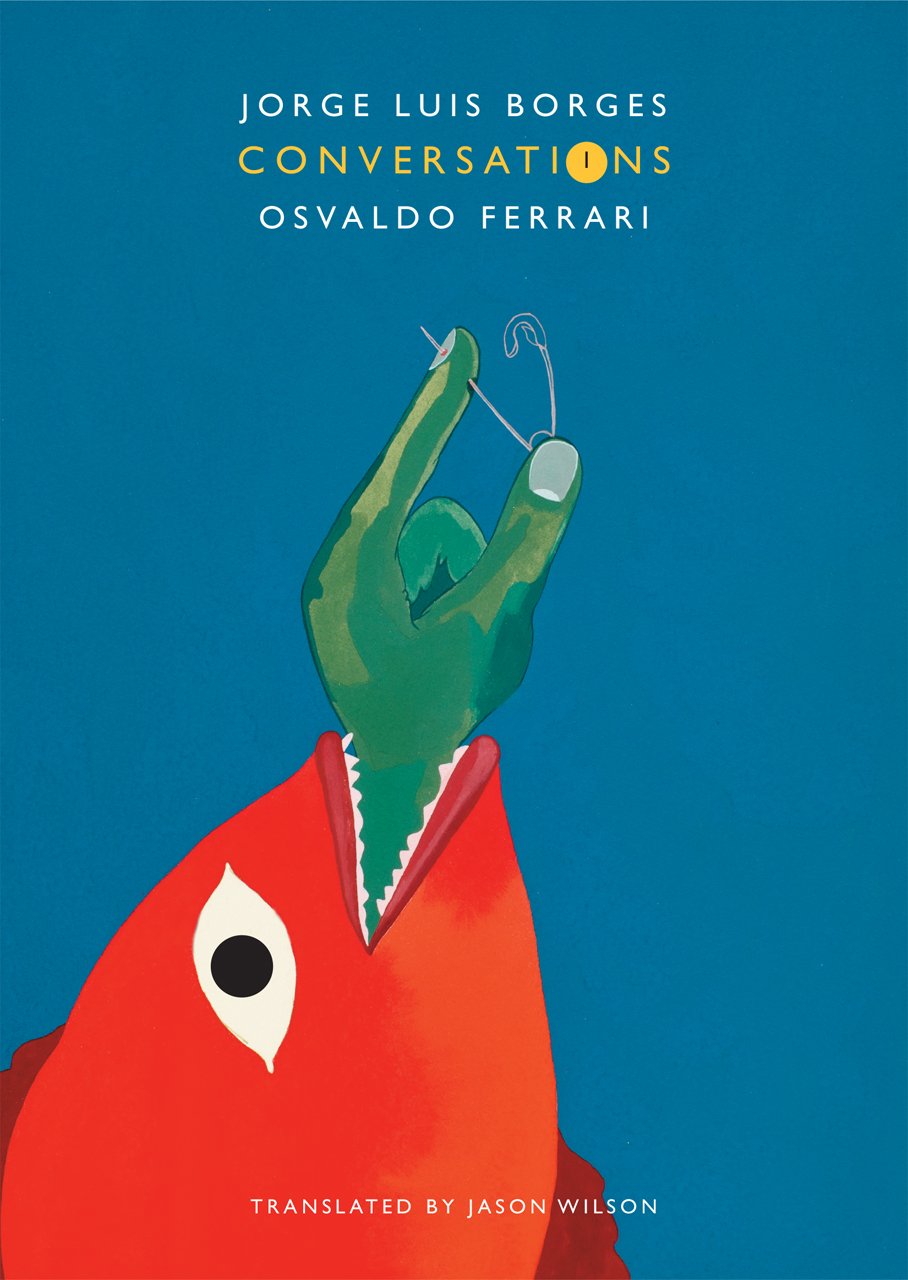 Jorge Luis Borges: Conversations, Vol. 1 Interviews by Osvaldo Ferrari. Translation by Jason Wilson Seagull Books, 2014 |
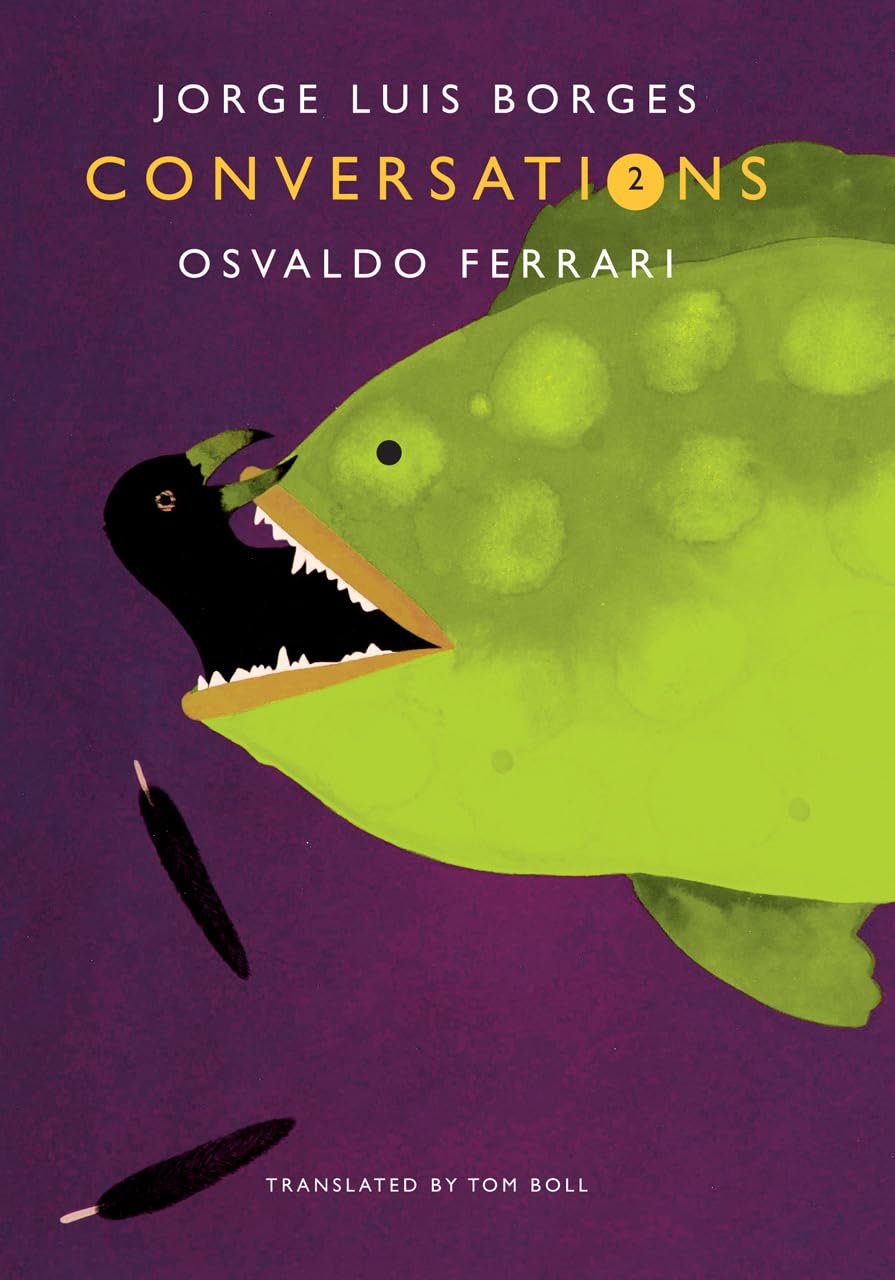 Jorge Luis Borges: Conversations, Vol. 2 Interviews by Osvaldo Ferrari. Translation by Tom Boll Seagull Books, 2015 |
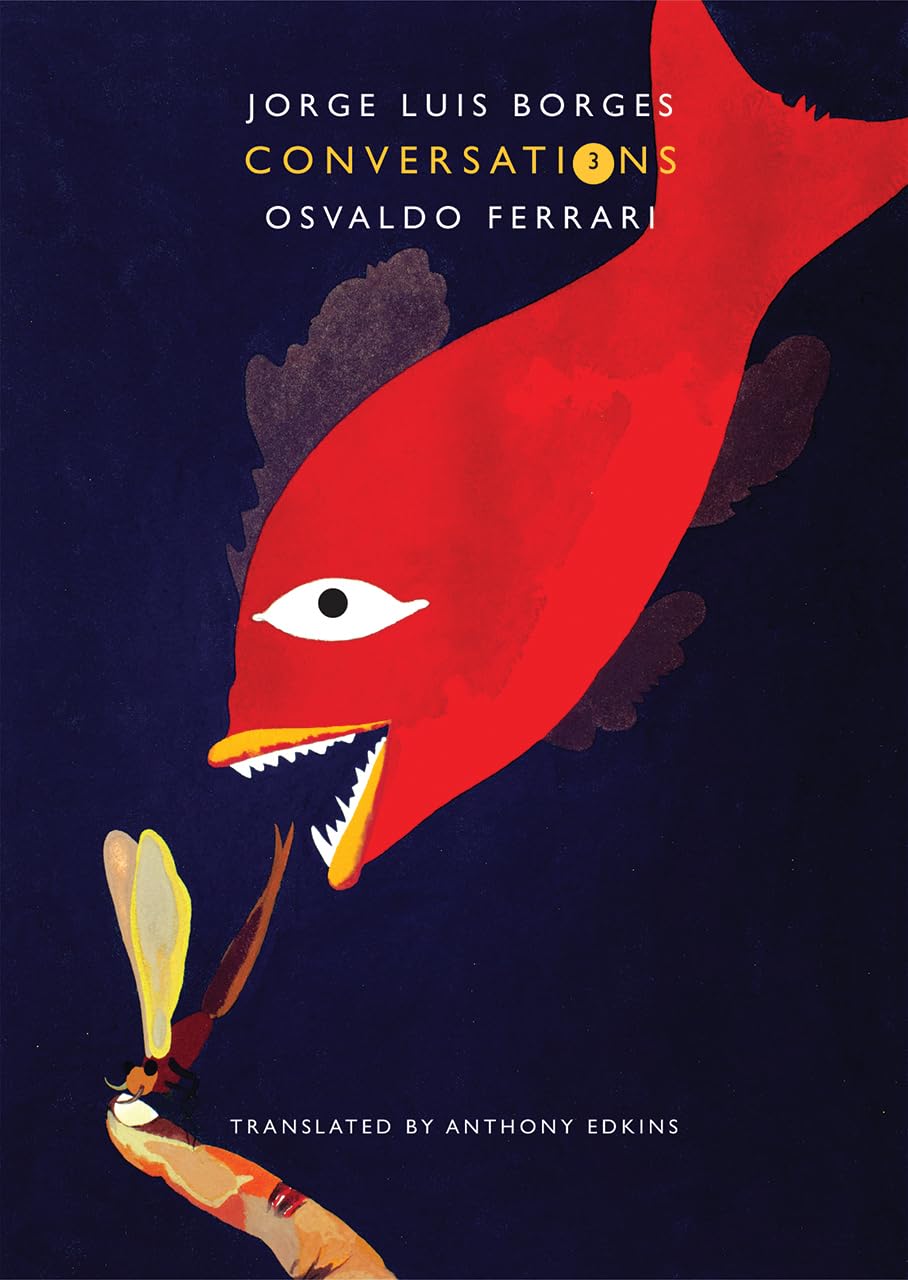 Jorge Luis Borges: Conversations, Vol. 3 Interviews by Osvaldo Ferrari. Translation by Anthony Edkins Seagull Books, 2017 |
Osvaldo Ferrari is an Argentine poet and teacher who organized radio conversations with several famous writers in the 1980s. From March 1984 to October 1985, Ferrari conducted a series of Friday broadcasts with Jorge Luis Borges for LS10 Radio Municipal. Generally lasting fifteen minutes, over one hundred of these dialogues were recorded, many of which were printed in the newspaper Tiempo Argentina. In 1985, a selection of the Borges-Ferrari dialogues were published as Borges en diálogo. More were collected in 1986 as Libro de diálogos, with Diálogos últimos following in 1987. The dialogues were very popular, and were translated into Italian, Portuguese, French, German, Polish, and Russian across many foreign editions, variations, and reprints. In 1998, Editorial Sudamericana reorganized the interviews into a two-volume set, En diálogo I and En diálogo II. A year later, they collected twenty-eight “outtakes” as Reencuentro diálogos inéditos. From 2014–2017, Seagull Books translated the dialogues into English as a three-volume set called Conversations.
The Garden of Forking Paths has a full description and review of Conversations available on the “Borges Reviews” section.
Jorge Luis Borges: The Last Interview
Interview 1985
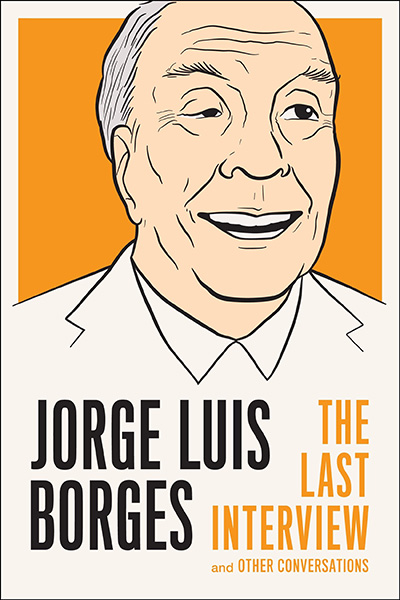
Jorge Luis Borges: The Last Interview & Other Conversations
Interviews by Richard Burgin, Artful Dodge, & Gloria Lopez Lecube. Translation by Kit Maude
Melville House, 2013
Online at: Internet Archive
In 1985 Borges gave his last formal interview, a conversation with radio personality Gloria López Lecube recorded for Argentina’s La Isla FM. Translated for the first time into English in 2013, the interview was published by Melville House as part of their “Last Interview” series. Because the La Isla interview is fairly short, Melville House added two previously-published interviews to create a more substantial book. The Garden of Forking Paths has a full description and review of The Last Interview available on the “Borges Reviews” section.
Borges Works
Main Page — Return to the Borges Works main page and index.
Fictions and Artifices — Short stories; the core Borges works.
Nonfiction — Collections of essays and criticism.
Collaborations with Bioy Casares — Fiction and anthologies written or edited with Adolfo Bioy Casares.
Collaborations with Others — Fiction and anthologies written or edited with others.
Poetry Compilations — Selections of Borges’ verse translated into English and published as compilations.
Poetry I — Early post-ultraísmo poetry, 1923 to 1943.
Poetry II — Mid-career collections from 1944 to 1969.
Poetry III — Late poetry books from 1969 to 1985.
Author: Allen B. Ruch
Last Modified: 5 August 2024
Main Borges Page: The Garden of Forking Paths
Contact: quail(at)shipwrecklibrary(dot)com

